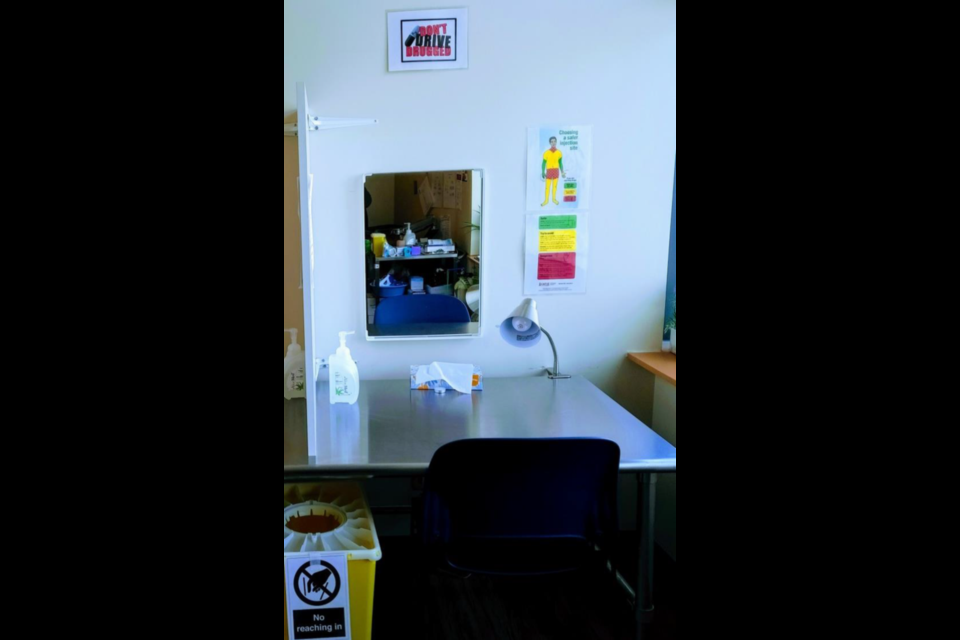It’s not only saving lives, Guelph’s consumption and treatment services (CTS) site is helping to make positive changes in many people’s lives, health officials say, looking back on the centre's two and a half years of operation.
“We see addiction as a chronic health condition, so we treat it like we treat all other chronic health conditions, with wrap-around programs and services,” said Melissa Kwiatkowski, director of primary care for Guelph Community Health Centre (GCHC), which runs the centre.
“Many of the fears that come up prior to sites being initiated are grounded in fear and stigma. The fears and concerns don’t actually happen in reality," she added.
Here in Barrie, public health officials have submitted applications to the provincial and federal governments for a similar supervised consumption site (SCS), which could be located at 11 Innisfil St.
In Guelph, the facility is operated out of GCHC’s Wyndham Street location. The CTS site offers two booths where drug users can inject themselves under the supervision and monitoring of trained medical staff, access harm reduction supplies and naloxone kits, as well as receive support and referrals regarding addiction treatment, primary care, mental health and social services.
Between the start of April 2020 and the end of March 2021, the Guelph CTS received about 5,500 visits from 185 individuals. During that time, 49 overdoses were reversed, with one person transported to hospital for care.
Those are significant statistics on their own, says Kwiatkowski, but there’s more. That timeframe also saw about 150 people connected with addiction treatment services, nearly 300 referrals to social services such as employment, food and housing, and about 200 referrals for primary care services for acute, urgent or chronic medical issues.
“The wrap-around supports are really important,” Kwiatkowski said. “We’re reducing demand on the emergency department, on acute care. We’re getting people connected with wrap-around support services that support their overall health and reduce rates of infectious diseases and other things.”
Prior to the pandemic, the centre saw an average of between 35 and 40 people per day. Now it’s about 20, in large part due to COVID-related precautions that have been put in place.
If not for the CTS, Kwiatkowski believes we’d see a lot more of what was seen before the centre opened – people using drugs out in the open and in unsafe spaces, more discarded needles in the community and loss of life.
“When we are failing the most vulnerable in our society, it actually pulls the entire community down,” said Guelph Mayor Cam Guthrie, who recently urged Cambridge city council to open a CTS in its community. “We have to embrace these types of sites… not just for the people but for our community so that people can get the help that they need.”
Initially, Guthrie wasn’t behind the idea of having an earlier version of a CTS site in Guelph. When the concept first surfaced, he, like some others, thought they simply enabled drug users and ruined neighbourhoods where they’re located, while encouraging more crime. He’s now ashamed to have thought that way.
“A lot of it, I think, was just about not being open-minded enough at the time to ask questions of clarity and… how it would operate, how it could actually help people,” the mayor said. “I had a biased opinion about how it would be. A lot of that was very negative opinions.”
That earlier incarnation of a CTS, known as an overdose protection site, didn’t require Guelph city council’s support to get up and running, but when permanent approval was sought in 2019 following the one-year pilot project, it was a different scenario.
Guthrie says he changed his mind about the idea before the pilot project even began after gaining a better understanding of how the program would be run and how it would help people. By the time an application for the permanent site came to council, it was onboard with the idea and granted its unanimous support.
Asked why he felt compelled to speak to Cambridge city council, Guthrie said he thought they could benefit from his experience.
“I wanted the decision-makers to be able to hear from someone who has had this exact thing actually operating for three years in the city. My perspective, I think, is important for people to hear when people’s lives are at stake,” the mayor said.
As for GCHC’s satellite CTS operating out of the Loyola House temporary supportive housing project at the Ignatius Jesuit Centre in the Guelph’s north end, that’s set to come to an end next month, Kwiatkowski said.
Health Canada approval for the site expires at the end of November, which is when Wellington County’s lease there also expires and it needs to find a new location for its program aimed at addressing homelessness.
There are no plans to seek approval for a new satellite site, Kwiatkowski noted.


.png;w=120;h=80;mode=crop)
